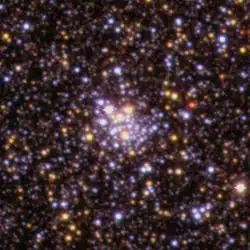| NGC 306 | |
|---|---|
 NGC 306 with DECam | |
| Observation data (J2000 epoch) | |
| Right ascension | 00h 54m 14.2s[1] |
| Declination | −72° 14′ 32″[1] |
| Distance | ~200000 ly |
| Apparent magnitude (V) | 12.07[2] |
| Apparent dimensions (V) | 1.1′ × 1.1′[2] |
| Physical characteristics | |
| Mass | 1.9×103[3] M☉ |
| Estimated age | 59 Myr[3] |
| Other designations | ESO 029-SC 023.[1] |
| Associations | |
| Constellation | Tucana |
NGC 306 is an open cluster in the Small Magellanic Cloud. It is located in the constellation Tucana. It was discovered on October 4, 1836, by John Herschel.[4]
References
- 1 2 3 "NASA/IPAC Extragalactic Database". Results for NGC 0306. Retrieved September 2, 2016.
- 1 2 "NGC 306". SIMBAD. Centre de données astronomiques de Strasbourg. Retrieved December 31, 2016.
- 1 2 Gatto, M.; Ripepi, V.; Bellazzini, M.; Tosi, M.; Cignoni, M.; Tortora, C.; Leccia, S.; Clementini, G.; Grebel, E. K.; Longo, G.; Marconi, M.; Musella, I. (2021). "STEP survey – II. Structural analysis of 170 star clusters in the SMC". Monthly Notices of the Royal Astronomical Society. 507 (3): 3312–3330. arXiv:2108.02791. doi:10.1093/mnras/stab2297.
- ↑ "New General Catalog Objects: NGC 300 - 349". Cseligman. Retrieved October 20, 2016.
This article is issued from Wikipedia. The text is licensed under Creative Commons - Attribution - Sharealike. Additional terms may apply for the media files.